Dynasty mode is one of the crown jewels of EA Sports College Football 25, thanks in no small part to its incredibly detailed, complicated, and intricate recruiting system. Nothing is more important to building a college football powerhouse than the talent you’re able to bring in year in and year out, but recruiting the best players in the country isn’t easy, especially if you’re trying to bring a smaller school within striking distance of the playoff picture.
To help you build the CFB champions of your dreams, we’ve put together a list of tips for how to level-up your recruiting game and land the best prospects in the country in College Football 25.
Study your Team Needs spreadsheet
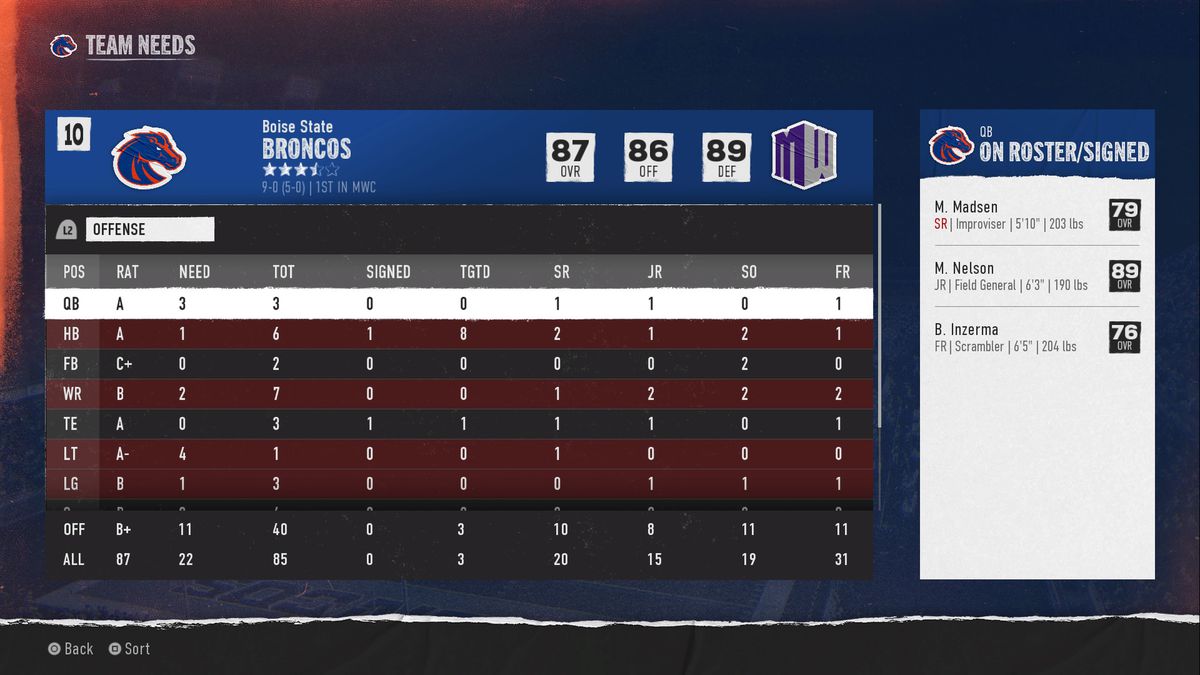
It’s entirely possible to track your roster’s shortcomings by hand, but thankfully College Football 25 doesn’t make you do that kind of work. Instead, you should spend a significant amount of your recruiting time in the Team Needs spreadsheet — which you can find by pressing the right stick while in the recruiting menu.
This screen will let you know which positions you’re currently light at, and which ones you’ll need more of because you’ve got exiting seniors or players expected to declare for the draft. It will also let you know how many players at each position you’re targeting on your prospect list, and how many you’ve already got committed this season. You shouldn’t feel limited to only recruiting positions of need, but they should be the first bases you cover each recruiting season, and they’re particularly important in the offseason when the Transfer Portal rears around (more on that later). —AG
Focus on the big fish early, but don’t get your heart set on them
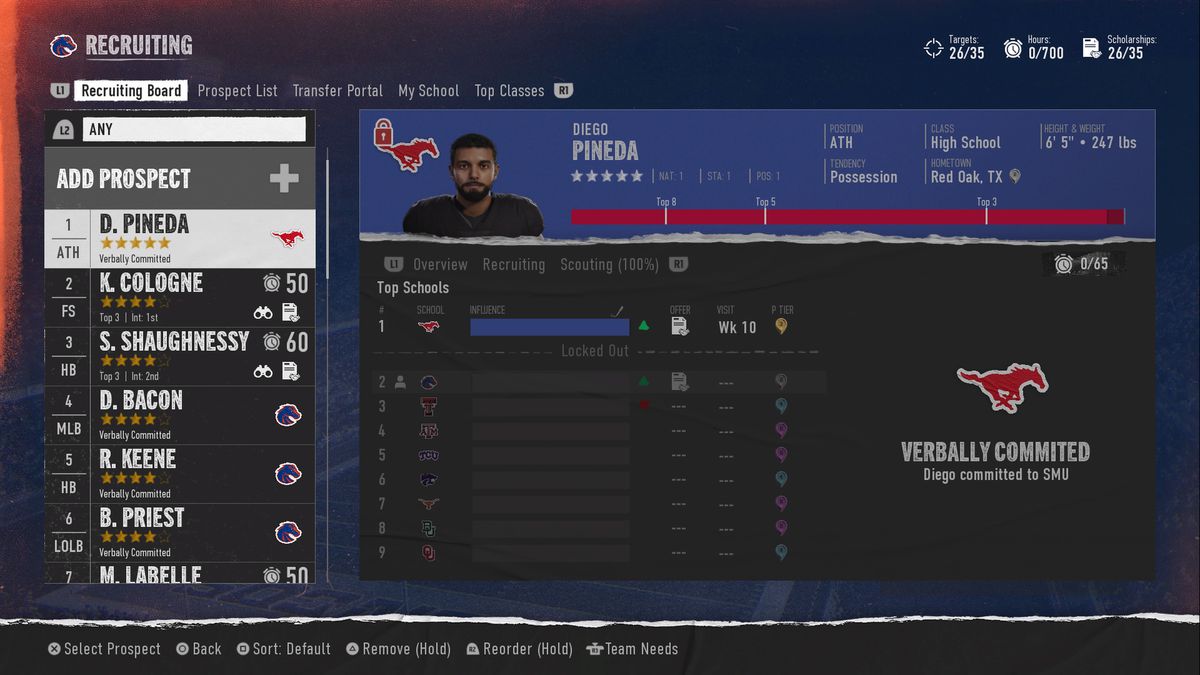
The early fall is time for hope in football programs all across the country, both for a better season than the one before, and for all those five-star recruits that barely paid your program a passing glance. You get more hours in the pre-season than you will the rest of the year, so take big shots. Send the House for the five-star who has you listed 8th, and gamble on any high-quality recruits you can. While the chances are probably slim, you might get lucky with a couple of players who happen to match your program just right.
But hope isn’t a guarantee, so it’s best to have a backup plan. While you may land the player of your dreams, especially if you’re at a bigger school, the chances are good that most of the 5-stars are going somewhere with a little more prestige than your burgeoning dynasty can muster just yet. But that doesn’t mean you shouldn’t chase them for a while. —AG
Find the prospects other teams missed
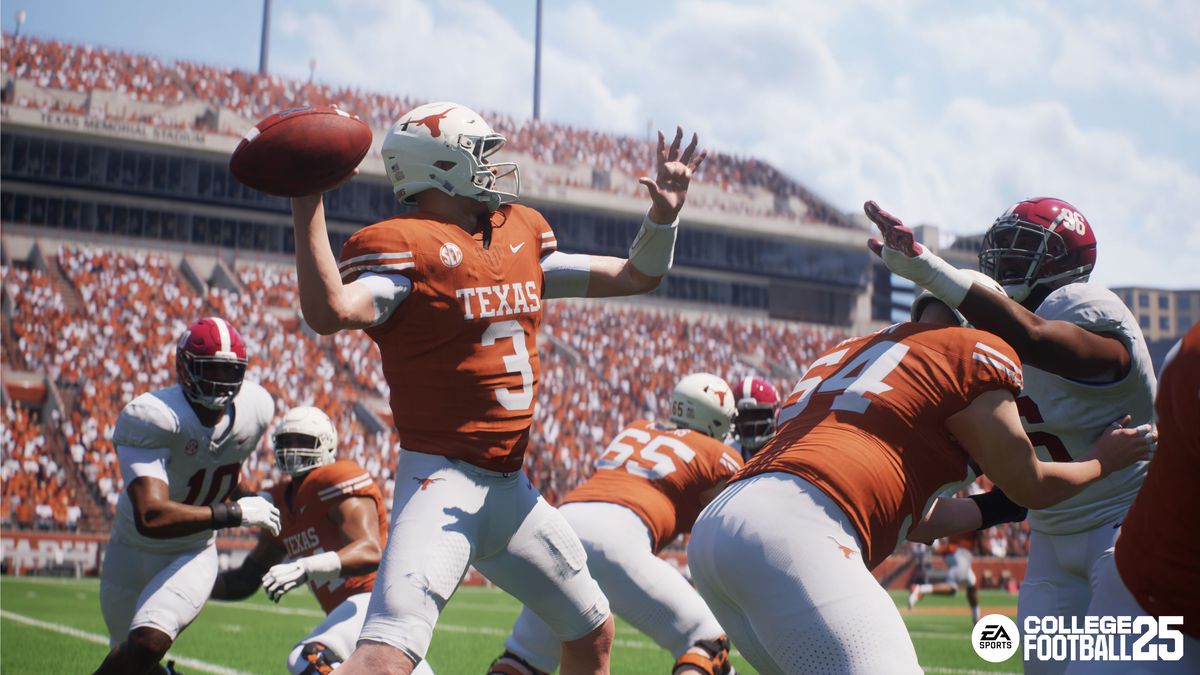
My current Dynasty file is with New Mexico, which starts as a one-star program. That means there are very few four-star prospects who will even give me the time of day (and even fewer five-star prospects).
In the preseason stage of recruiting, I follow the advice above: Find every four- and five-star prospect that will even listen to me, and offer scholarships to the ones I would want on my team. By the time the season starts, most of them end up off my board, because they’ve been offered by bigger schools that I simply can’t compete with. But this also leads to the crucial part: Identifying the best prospects that bigger schools overlooked
It’s actually pretty easy: In Week 0, I filter prospects by “five-star recruits” and “four-star recruits,” respectively, and then sort it by offers received. (The format for this column is Y for if you’ve offered the prospect, N for if you haven’t, and then their number of total offers in parentheses – you’re looking for a 0 there). Every single elite recruit without any offers is getting an offer from me.
Using this strategy, I’ve been able to land at least four four-star recruits in each of my three recruiting classes at New Mexico. Later in the recruiting cycle, I fill out the rest of my class with solid three- and two-star prospects, but being able to land these overlooked elite recruits has made a huge difference. —PV
The recommended tab is your friend, but don’t rely on it alone
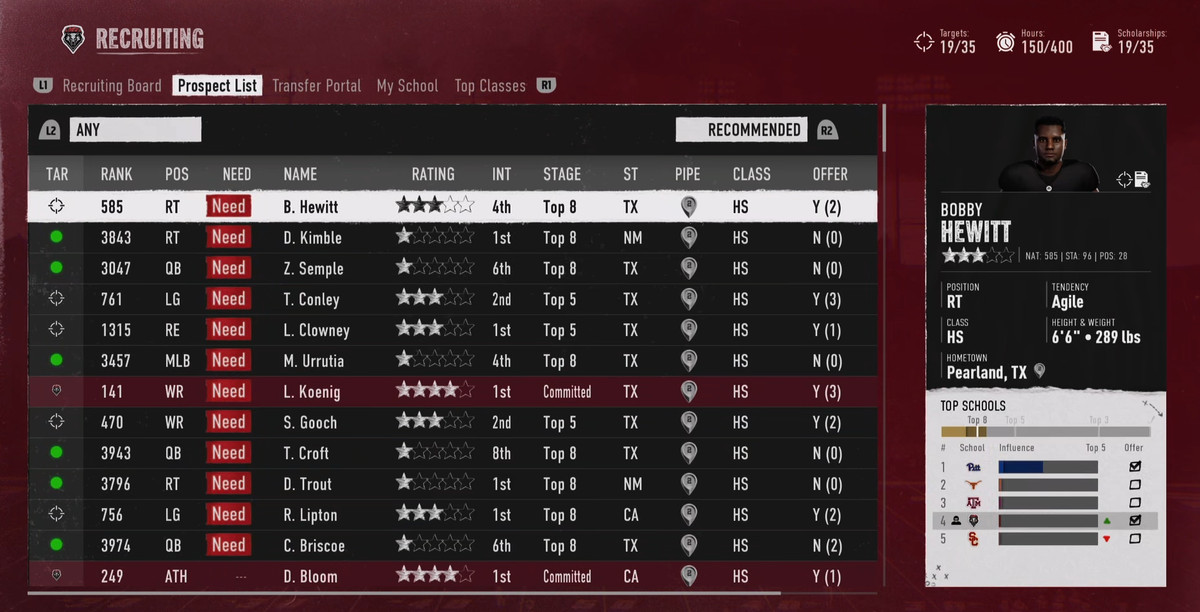
EA Sports College Football 25’s recruiting system features a recommended tab, which surfaces players the game thinks you should target. This largely shows you players that already have you in their top 10, or realistic targets in pipeline states. I find this to be an easy way to find solid recruits to fill out the rest of my class later in the recruiting cycle, but I tend to ignore it at the very beginning unless there are big time prospects that are considering my school (but I’ll likely find those anyway). —PV
Use your pipelines
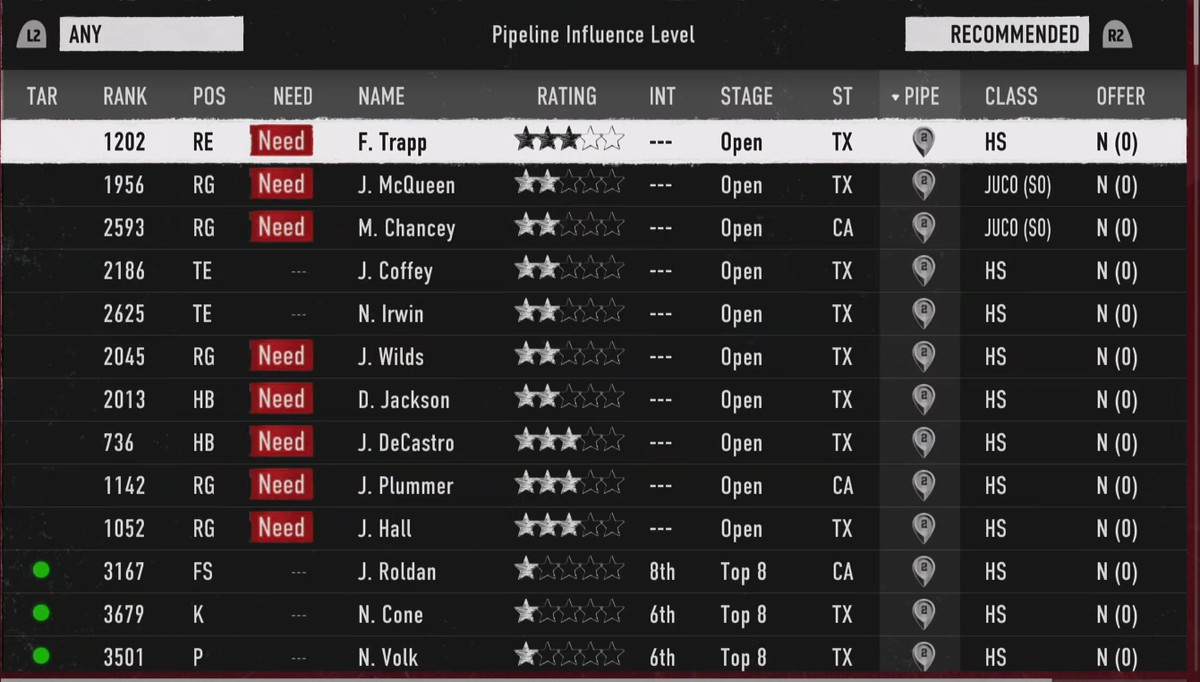
Pipelines are a crucial mechanic in EA Sports College Football 25, as both your school and your coaches have them. Basically, pipelines give you bonuses to recruits from certain regions of the country. Use this! If all else is equal, it is better to spend your hours on a recruit from a pipeline region than one who isn’t – you’re simply going to get more bang for your buck. That doesn’t mean you should totally box out recruits from non-pipeline regions (sometimes, you can land them!), but it’s worth prioritizing regions that you already have a footprint in, just like real life.
At New Mexico, that means every season my first targets are the top players in the state of New Mexico, followed by the best players in Texas and California that the big schools in those states aren’t offering. Occasionally, I’ll pick up players from other states, but that’s where the bulk of my recruiting classes are coming from. —PV
Use your hours wisely
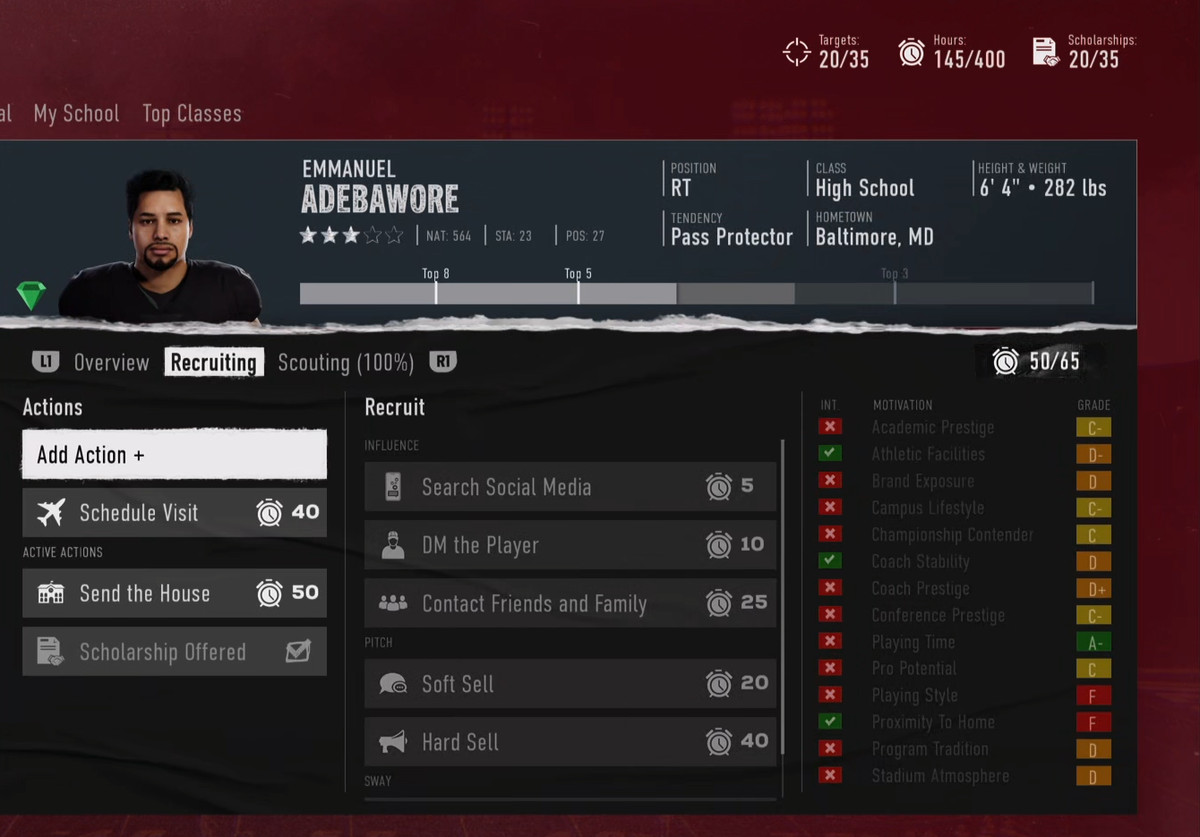
You have a limited number of hours each week to spend on recruiting actions, and those hours are even more limited if you’re a small school. So how do you spend them? I tend to max available hours on my biggest targets – the four- or five-star recruits – and spend as much as I can there until they have committed to my school or locked me out. At that point, I move on to the three- and two-star recruits, scouting them (more on that in a second) and spending my hours on them.
After you get to know a recruit well enough, you unlock the option to “Hard Sell” or “Soft Sell.” This allows you to make a more targeted pitch to the recruit, highlighting three specific areas you want to focus on. This is best used when your program’s strengths line up with the recruits priorities (which will be shown with a check mark on the recruiting tab). If you’re able to sell them well on all three of their priorities at once, it’s going to help you out massively on the recruiting trail. If they don’t align, your hours might be better spent elsewhere. —PV
When to scout and when not to scout
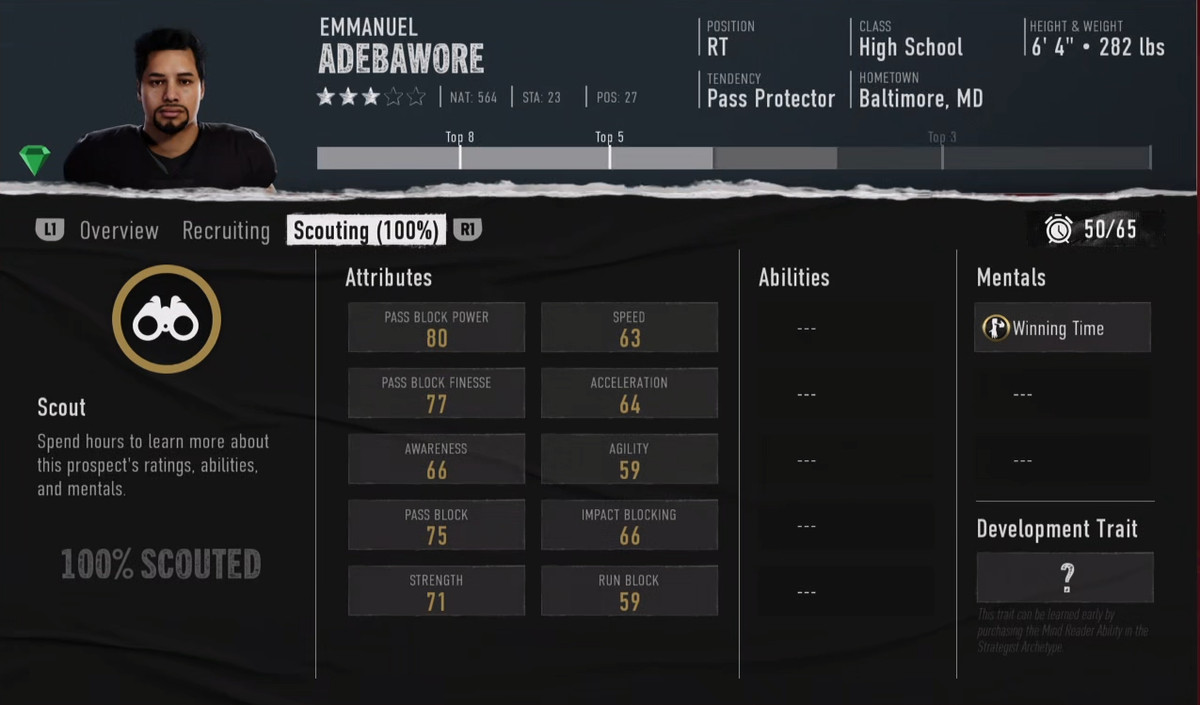
You have the option to scout recruits, learning more about their attributes, and if you fully scout them, the game will tell you whether they are a gem (with a green gem icon), a bust (with a red X over a gem icon), or neither. Think of a gem as a player whose actual ratings are equivalent to a star rating above them, and a bust as the opposite. So a three-star gem is more like a four-star recruit, and a three-star bust is more like a two-star recruit.
When to scout depends largely on the program you’re running and what kind of recruits you want in the door, but in my save file with New Mexico, I don’t scout any four- or five-star recruits ever. Even if they are busts, they will still benefit my program. I do scout almost all three- and two-star recruits I am considering, to try and prioritize gems. If possible, I try to do some scouting in the preseason, but lately that’s been waiting until midseason so that I can maximize my limited available hours on just the four- and five-star recruits I’m targeting.
One other note, which we’ll follow up on in a second: Don’t scout players in the Transfer Portal. Because they are known entities in college, there isn’t the degree of mystery that there is with high school players, and their listed star rating is their real one. There are no gems or busts in the Transfer Portal. —PV
The Transfer Portal is here to help, but don’t bank on it
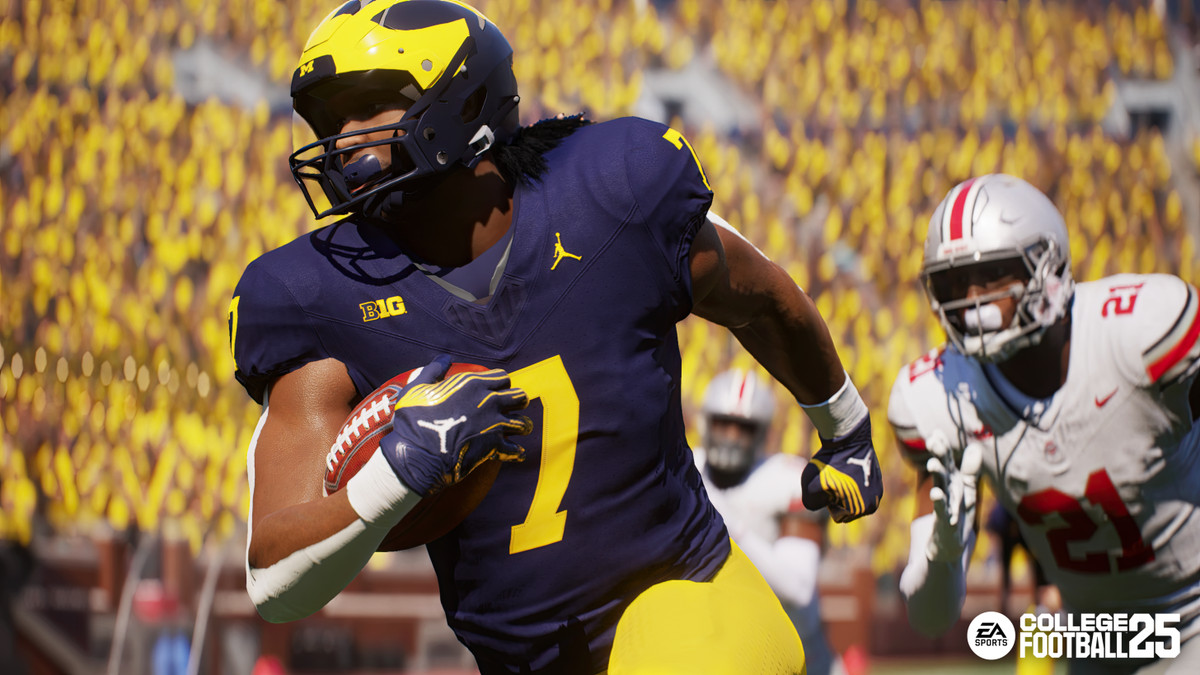
The Transfer Portal is one of the most helpful tools in the recruiting process. At the end of every season, players unhappy with their current team situation can throw themselves into the whirlpool of the Portal, opening themselves up to offers from teams all around the country — including yours. This is the perfect way to fill out some depth for your roster, or to chase one or two more stars before you get ready to start your next season, but you shouldn’t count on it to fill all the gaps on your team. There’s no telling exactly who will be in the Transfer Portal each year or how good they’ll be.
For this reason, it’s best to approach the Portal by looking for any stars within your grasp, as well as maybe a third or fourth string player at a couple positions, rather than counting on getting a surefire starter who was unhappy at their previous school. —AG
What you need to know about Visits
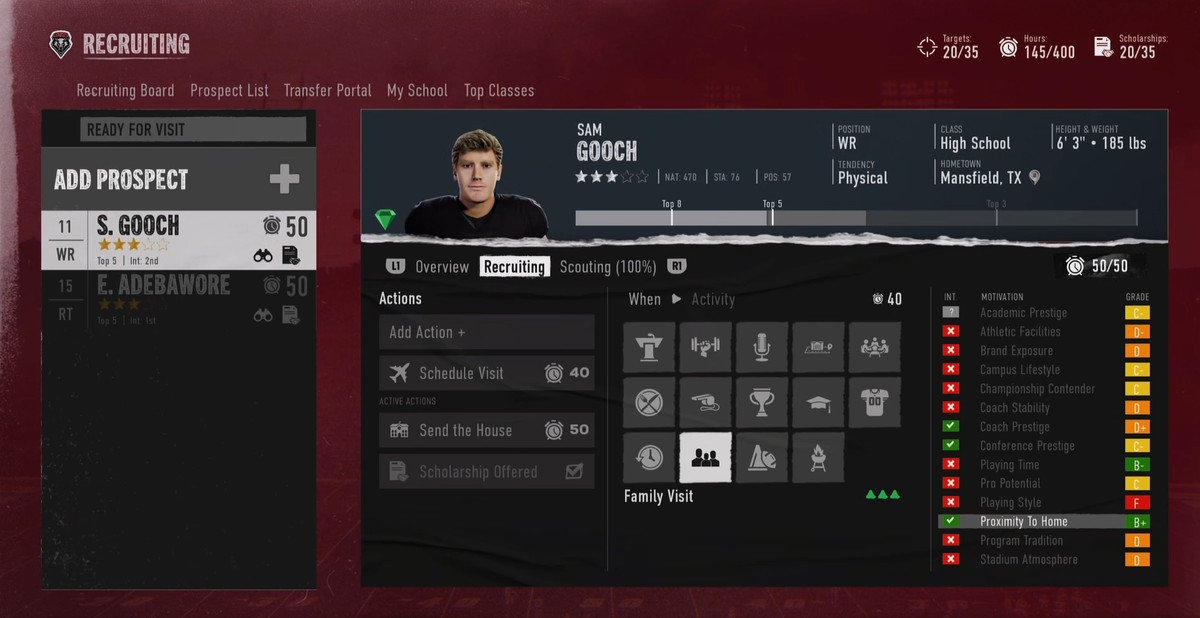
Visits are a particularly effective and important recruiting tool that becomes available after a player has listed your school in their top 5 choice. From there you can invite them to your campus for a home gameday. During their stay, you can have them focus on one element of your program. Ideally for this you’ll want to choose a category that’s important to them (has a checkmark next to it on their scouting sheet) as well as something you’re rated highly on, ideally with a B grade or higher.
While these visits are a great way to seal the deal with recruits, there are a lot of nuances to doing them right. For instance, you’ll lose influence with the player you’re recruiting if you lose the game the week of their visit. Even more importantly, you can schedule multiple players to visit on the same week, which can give you either complementary bonuses or conflicting penalties. If you have a quarterback and a wide receiver both visit on week 8, they’ll compliment each other and each boost the other’s interest. On the other hand, if you have something like three cornerbacks all visiting at the same time, their interest will all drop because they don’t feel you’re as interested in them specifically.
All of this leads to visits being a bit of an imprecise science, but still a very important tool to get used to in your recruiting adventures. —AG
The end is not necessarily the end
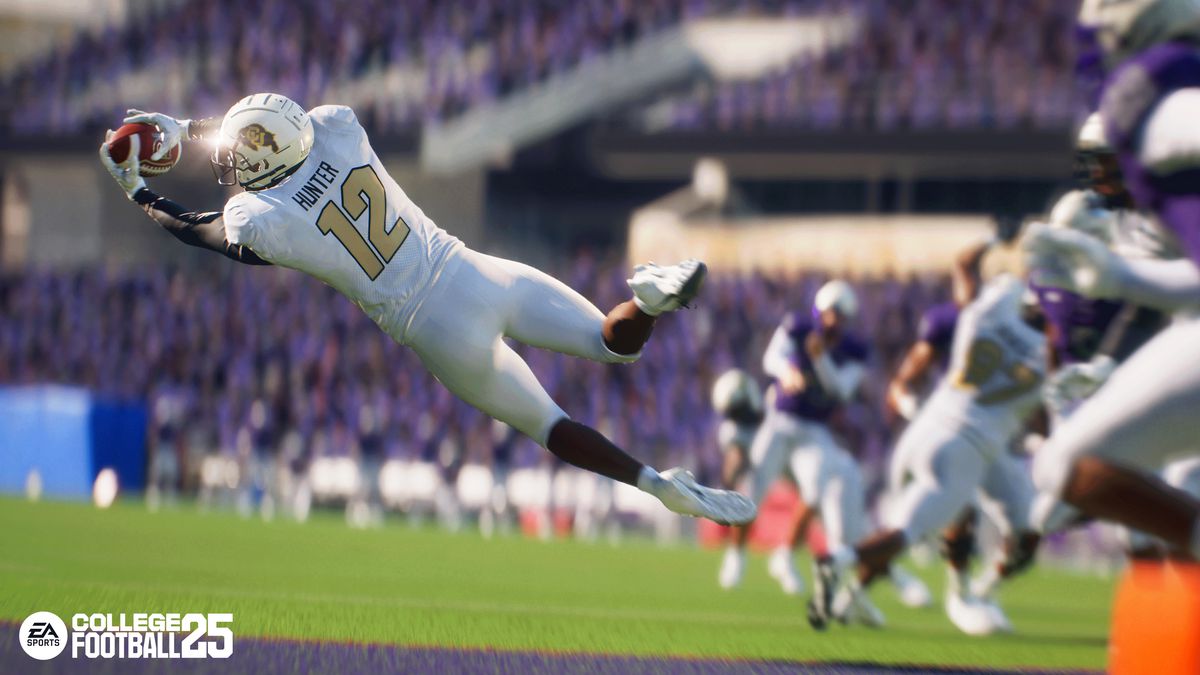
Sometimes, a recruit can seemingly lock you out – but that’s not always the end of things. Each recruit has a Dealbreaker – one element of a school that they prioritize above all else. Some of those Dealbreakers are fluid – Playing Style, Playing Time, Championship Contender can all change over the course of the season. If a recruit commits to a school, and then their Dealbreaker is no longer valid with that school, they could still de-commit and sign with you on National Signing Day.
Similarly, with New Mexico, I offered scholarships in the preseason to a group of prospects with Championship Contender as their Dealbreakers. At the time, my Championship Contender rating was sufficient, but over the course of the season, it dipped below what was acceptable for them, and I was seemingly locked out. However, no other school offered any of the recruits a scholarship, so I kept them on my recruiting board just in case. When Signing Day came around, sure enough, those recruits signed for me, even though their Dealbreaker didn’t fit with my school. Now, they’ll be at a higher threat of transferring than other recruits, because players retain their Dealbreakers once they get to college, but I got them in the door. —PV
For more College Football 25 guides, see our beginner’s guide, learn how to throw a perfect touch pass, and check our recommendations for how to pick the best pipelines.